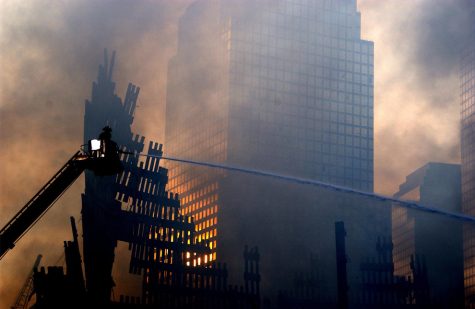Remembering 9/11
Adults recount the tragedy and its impact on the 20th anniversary
September 11, 2021
This year, the U.S. recognizes the 20th anniversary of Sept. 11, 2001, when New York City’s World Trade Center was destroyed by two airplanes hijacked by the terrorist group al-Qaida. Hours later, a third plane crashed into The Pentagon and a fourth plane crashed into Shanksville, Pennsylvania, amounting to nearly 3,000 lives lost in the nation.
The effects of the attacks presented themselves in different ways — an economic collapse, a larger focus on national security and most prominently, the beginning of the War on Terror. The 9/11 attacks drastically changed the course of the nation socially and politically, and were also the beginning of increased Islamophobia and racism towards immigrants. Twenty years later, the legacy of 9/11 carries on and its large imprint on survivors and other American citizens is still visible.
“I don’t think we were looking for justice — we were looking for revenge.”
Economics teacher Pete Pelkey was 42 years old on Sept. 11, 2001. On what began as a regular Tuesday morning, Pelkey remembers getting dressed for work at Homestead High School, where he taught Psychology. Before he left the house, his roommate urgently came out of her room with the news that a plane had crashed into the World Trade Center just hours before.
After discussing the severity of the incident with her, Pelkey believed the crash was merely the aftermath of a dysfunctional Cessna aircraft or someone’s poor piloting job. As he continued his day at HHS, a student later informed him that a second and third airplane had crashed into the South Tower and the Pentagon, and Pelkey realized that these plane crashes were not simply accidents — they were terrorist attacks on the nation.
“When the second one hits … you know it’s on purpose,” Pelkey said. “Then you’re finding out that [they’re] bigger planes than you thought, filled with gasoline, and you realize, ‘Oh my gosh, they were using these as bombs … we’re under attack.’ I remember my wife was [seven months] pregnant and the baby was coming in November, and we were thinking, “Do we want to bring a child into this world right now?”
For the next week, Pelkey explains that the nation’s economy completely shut down as people processed the tragedy of the event — an economic phenomenon that is coined as a “soft landing.” He adds that for the next few months, the U.S. saw a downturn in economic activity that narrowly avoided turning into a recession after the Christmas season, during which U.S. retail sales increased.
According to Pelkey, after 9/11, U.S. citizens also developed a collective animosity towards al-Qaida and the Middle East in general, fueled by President George Bush’s decision to invade Afghanistan in order to combat global terrorism. Pelkey feels that Bush instilled a sense of urgency in U.S. citizens to take action, and he remembers the media becoming infiltrated with ideas of growing nationalism.

“If George Bush had died within those first 100 days after 9/11, we would think of George Washington, Abraham Lincoln and George Bush as the greatest presidents ever,” Pelkey said. “His anger met our anger, and he had this [idea that] ‘We’re going to take care of business, we’re going to get these bad guys. We’re going to get al-Qaida, and we’re going to do this at a very low cost of American lives.’ That’s when we started helping the Northern Alliance in Afghanistan and started the never-ending war, but we didn’t know that at the time.”
Pelkey says that the nation’s desire to fight against the Middle East also fostered the beginning of extreme xenophobia in the U.S.. After 9/11, he found that airport security greatly tightened its restrictions and people began racially profiling immigrants on the basis of protecting national security. Watching the growing turmoil between the U.S. and Afghanistan in the years following 9/11, Pelkey felt that the U.S. was moving in the wrong direction by sending troops to the Middle East.
“I don’t think we were looking for justice — we were looking for revenge,” Pelkey said. “I think we overdid it too. We got so bad that we took out Afghanistan, we threw a nation into a chaotic civil war that lasted for 20 years and we’ve still never held those leaders [accountable]. We never said, ‘Hey, Cheney, Bush, Rumsfeld, what did you accomplish? Why did all those American men and women die? Why did all those Iraqis and Afghans die? What did we gain?’”
As the U.S. commemorates the 20th anniversary of the attacks, Pelkey reminds future generations to remember the lives lost, but also to condemn the xenophobic ideologies that emerged post-9/11. Labelling the event as the moment in U.S. history where Americans first “lost their compassion,” Pelkey hopes that the damages left from 2001 can one day be healed with time.
“For the people who lost their loved ones, it’s an absolute tragedy,” Pelkey said. “But should we continue down this road of being afraid of foreign people? Should we continue down this road of thinking that we shouldn’t trade with other countries? Long term, I’d love for Americans to find the kindness [that] they used to have again, because I just don’t see it anymore.”
“Security measures everywhere you go, metal detectors … that life starts Sept. 12.”
History teacher Bonnie Belshe was 22 years old on Sept. 11, 2001. She had just moved to San Francisco and was staying with her brother as she searched for a new job. Belshe was surprised to see her brother return from work early, immediately rushing to turn on the TV. Her confusion quickly developed into disbelief and horror as they spent the rest of the day watching the tragedy unfold on the news.
In the days to come, Belshe describes a fearful climate enveloping the nation. She remembers making the decision to cancel a job interview on Sept. 12 after her parents expressed their concern about the possible danger. Across the country, Belshe noticed that America had irreparably changed, with the creation of government agencies like Homeland Security and the Transportation Security Administration.
“It’s not 9/11 that’s the hard part to teach,” Belshe said. “What we need to teach students is what life was like on Sept. 10th, because that’s what [they] don’t know. Security measures everywhere you go, metal detectors … that life starts on Sept. 12. We have to explain what life was like on Sept. 10th, because we are still very much living in this national security state that we have.”

According to Belshe, something that captured the nation’s apprehension and fear most clearly was the debate over postponing the November 2002 midterm election. With the memory of 9/11 still fresh in everyone’s minds, a national discussion began over the possibility of another terrorist attack on Election Day. Yet for Belshe and other adamant voters, protecting the nation’s democracy and principles outweighed any possible risks.
“I was having a conversation with a friend about this, and said, ‘I don’t care if I have to crawl across broken glass on my hands and knees and nail my vote to the courthouse door, I am voting come November,’” Belshe said. “‘If anything, this is what we need to keep and not let 9/11 end and change for us.’”
As the 20th anniversary approaches, Belshe believes teachers should incorporate how 9/11 impacted the world today. In addition to recognizing the survivors and people who lived through 9/11, she hopes to aid students in understanding the nation’s heightened surveillance and security that followed the attacks.
“In terms of the impacts of 9/11, for [students] … this is [their] life,” Belshe said. “[They] don’t have that Sept. 10 day, an understanding of the world and the nation before. There is an education piece to [these anniversaries] to those who hadn’t been born yet, who were too young to understand. But I would like to see it paired with questions [about] why things are the way they are, and where did this increase in militarization come from? If we can get more questioning of that, then maybe [we] can perhaps see some changes.”
“We’re never going back to that pre-9/11 era.”
History teacher David Hartford was 12 years old on Sept. 11, 2001. Sitting in his math class in Monroe, Michigan, his quiet Tuesday morning was interrupted when the school principal walked to the front and turned on the TV. Hartford remembers a sense of disbelief across the classroom as students were faced with a sense of uncertainty.
In the hours that followed, Hartford recalls family members checking in throughout the day, talking in hushed voices with his grandparents. The mood in his household was tense, with everyone wondering what would happen next. The tragedy hit especially close to home as his father considered flying to New York to be a first responder, pulling bodies from the rubble of the towers. While his father did not end up going, Hartford remembers the immense respect he felt for all the firefighters and responders in the days following 9/11.
“When [my father] talked about volunteering and going to New York … I didn’t know if it was dangerous to go because I barely ever left the state, let alone the other side of the country,” Hartford said. “I think there was a little bit of concern there for me. But I also had a sense of pride because [I could have been] like, ‘My dad’s one of the firefighters,’ and [we] saw the images of firefighters pulling people out of the buildings, so it was kind of a mixed bag of emotions for me.”
Throughout the next week, Hartford felt that the nation’s mood began shifting from “concern of the people” to thinking, “What are we going to do about this?” The most vivid change he remembers was the transition in music, with patriotic anthems like “God Bless America” playing on every radio station. Hartford noticed that across the country, Americans felt compelled to take initiative and strike back against the Middle East, almost joining the U.S. Air Force himself days after he graduated college.
According to Hartford, part of the patriotism he felt and the version of events he remembers from 2001 was likely influenced by the environment around him. He attributes some of his stronger emotions to the narrative of righteous anger displayed by an older generation of adults and politicians.
“I think the biggest thing is that I wasn’t fully certain on what was going on,” Hartford said. “It’s [similar to] psychological studies about memories — how much [of it] is truly our own memory and how much of it is what you were told or what the stories and narratives are? Because I was younger, I was more susceptible to that, but as a history teacher I’ve been able to look back and try to separate and piece apart what [were] my original thoughts and what [weren’t].”
Twenty years later, Hartford believes that the U.S. is still suffering from the effects of the attacks. Beyond tangible changes to national security, he feels that a lasting product of 9/11 is the fear and anger expressed towards immigrants and foreigners. Hartford emphasizes the importance of remembering the history behind the 9/11 attacks, not only to avoid repeating the same mistakes, but to also understand how these tragic events shaped the course of the world.
“We see these major events that come up over and over, like 9/11, Pearl Harbor and the sinking of the USS Maine,” Hartford said. “We are never going back to that pre-9/11 era, but understanding the impact that 9/11 and these [other] events had on where we are today gives us a better understanding of what exactly we’re looking at in our present day.”
“Keeping yourself safe suddenly became a conversation when it wasn’t one before.”
Homestead High School alum ‘14 Adil Siddiqee was four years old on Sept. 11, 2001. His father was sent to Bangalore, India, for work, so Siddiqee and his family decided to move there from the U.S. to be closer to him. At a young age, Siddiqee could not completely process the events of the day, but he vividly remembers the faces of his crying parents and every TV screen in the house flashing at once. Later, Siddiqee moved to the Bay Area, but as he grew older, he would find out that his parents considered remaining in Bangalore out of fear of returning to the aftermath of the attacks.
As a Muslim American, Siddiqee feels that there was “a shift in the American persepective of Muslims” after the 9/11 attacks. As he grew older, Siddiquee heard stories of his relatives getting chased outside their homes and having bottles thrown at them, and he eventually found out that his old neighbors had threatened to kill his grandparents after the attacks. After being accosted in public, his mother decided to stop wearing the hijab and his sister had grown up without wearing one out of fear of being perceived as “exotic” or “foreign.”
“All these aggressions started becoming more normal,” Siddiqee said. “I was always stubborn and arrogant in terms of addressing [them] … but it doesn’t stop it from still happening. It was always something I would inadvertently hide from my parents, because right after 9/11 happened, my parents would speak often about how it’s not worth [getting mad]. Keeping yourself safe suddenly became a conversation when it wasn’t one before.”
Siddiqee believes he was fortunate to grow up in “the Bay Area utopia” with a large South Asian community and other people of color. He finds that his experiences with discrimination in the Bay Area were incomparable to what his relatives experienced in Pakistan and India. Despite living in the Bay Area bubble, however, he still remembers students asking if al-Qaida founder Osama Bin Laden was his uncle and being called a terrorist based on his ethnic name.

Siddiqee’s most prominent experience with Islamophobia occurred when he was called in during his first period to meet with a counselor, who informed Siddiqee that he had been reported by a student for a bomb threat. While administrators immediately recognized the report as a student’s prank, the incident reminded Siddiqee that the way Muslims were perceived in the U.S. had changed forever after 2001.
“I had never been more mad in my youth than when I learned that somebody, [out of] adolescent revenge, said that I was planning to blow up my school,” Siddiqee said. “It could have been a friend of mine to be honest. I couldn’t get over these [jokes] because I was already very coddled and sensitive as a lucky member of the Bay Area, where your problems with racial and religious discrimination are not as heavy.”
After former President Barack Obama declared the U.S.’s combat mission in Afghanistan over in 2014, Siddiqee believes the hostility towards Muslim Americans significantly decreased as citizens began to view the 9/11 attacks as a historical tragedy rather than a reason for justice. However, currently living in New York Center near the World Trade Center, Siddiqee still hears his friends make Islamaphobic remarks about the Twin Towers and Osama Bin Laden, reminding him that the effects of 9/11 on the Muslim community will never completely disappear from history.
“Even today, there’s still reverberations of the effects going on,” Siddiqee said. “Whenever we see a Muslim country in the news, people will rally back to 2000s talking points of ‘Islam is not a religion of peace.’ I have brown and Muslim family in [Southern states] that have said, ‘We’re still considered something different here.’ But thanks to the Bay Area’s support for one another, I’m very lucky to have escaped and evacuated from the effects of the event.”
